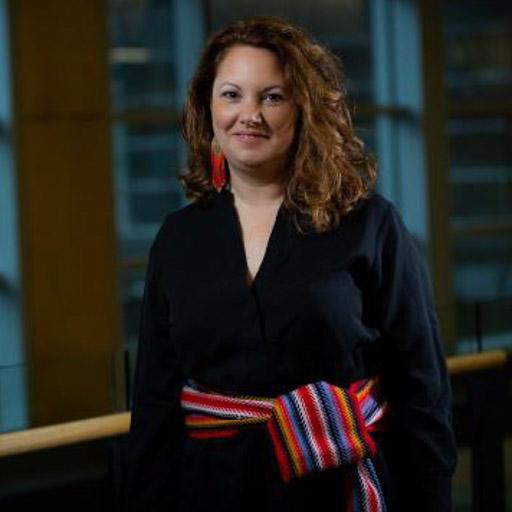
Elizabeth Fast
- Associate Professor, Applied Human Sciences
Are you the profile owner?
Sign in to editResearch areas: Land-based learning, Indigenous youth, identity, urban Indigenous peoples, child welfare reform, Indigenous post-secondary education, Indigenous methodologies
Contact information
Biography
Biography
Elizabeth is Métis and Mennonite from St. François-Xavier, Manitoba. She has a PhD in Social Work from McGill University (2014) and was hired as a Strategic Hire for Indigenous Youth at Concordia University in 2015 as an Assistant Professor in the Department of Applied Human Sciences. From 2016-2017 Elizabeth served as the Special Advisor to the Provost on Indigenous Directions at Concordia. Before returning to school, Elizabeth worked with youth that were transitioning out of care from the child welfare system and as a social worker. Elizabeth is currently the principal investigator on a SSHRC research grant that seeks to explore the impacts of land-based learning for urban Indigenous youth and community.
Teaching activities
Courses taught
AHSC 311:Respecting Diversity in the Human Relations
AHSC 398:Critical Indigenous Perspectives Across the Disciplines
AHSC 525:Individual and Group Intervention
FPST 402:First Peoples' Contemporary Social Issues
Research activities
Concordia University Research Chair
Concordia University Research Chair inLand-based learning and Indigenous pedagogies, $100,000 (2020-2025)
SSHRC Insight Grant
The Land as our Teacher, $330,000 (2019-2024)
FRQSC Youth Research Chair
Indigenous youth research chair, $1, 000, 000 (2018-2024), Co-investigator
SSHRC Insight Development Grant
Restoring our Roots: Land-based learning and urban Indigenous youth, $62, 000 (2016-2018)
SSHRC College and Community Innovation Fund
Publications
Fast, E., Lefebvre, M., Reid, C.,Deer, B., Clark, M., Boldo, V., Swiftwolfe,D.,
Mackie, J., Tutanuak, K., Mackie,R. (2021). Restoring our Roots: Land-based healing for Indigenous youth. International Journal of Indigenous Health, 14(3). Guest edition of the First Nations Health Authority.Fast, E. & Drouin-Gagné, M.E. (2019). We need to getbetter at this! How colonial histories are responded to in the classroom. SpecialIssue: Responses to Interpersonal Violence in the International Journal of child, youth and family studies, 10(1), pp.95-118. DOI: 10.18357/ijcyfs101201918808
R., A., Lewis, DOI:
Fast, E.,Nutton, J.De La Sablonnière-Griffin, M.,Kozlowski, A., Bertrand, S.,
Bertrand, N.&Mitchell, J. (2016). Regard sur l’interaction de l’urbanisation, du traumatisme historique et de l’identité culturelle parmi la jeunesse autochtone au Canada, Enfances Familles Générations, 25, http://efg.revues.org/1134
Hélie,S., Fast, E., Turcotte, D., Trocmé,N. (2015). Major findings from the Québec incidence study of reported child abuse and neglect. Special issue on child maltreatment for the Canadian Journal of Public Health.
Fast, E.,Trocmé, N., Ives, N., Bertrand, S., Bertrand, N., Mitchell,J. (Accepted). Definitions and barriers to cultural identity among urbanIndigenous youth in Montreal: Resistance and negotiation. In E. GonzálezCastillo & Cartonde Gramont, N. (Eds.) Politics, economyand popular culture in the Americas.
Nutton,J. & Fast, E. (2015). Historical trauma, substance misuse andIndigenous peoples: Seven generations of harm from a ‘Big Event’. Journalof Substance Abuse and Misuse, 50, 839-847.
Fast, E., Trocmé, N.Fallon, B., Ma, J., (2014). Adolescents in the Canadian child welfare system: A troubled group? Analyses from the Canadian incidence study-2008, Children and Youth Services Review, 46, 47-54.
Sinha,V., Trocmé, N., Fallon, N., MacLaurin, B., Fast,E., Thomas Prokop, S. et al (2011). KiskisikAwasisak: Remember the children. Understanding the overrepresentation of FirstNations children in the child welfare system. Ontario: Assembly of FirstNations. Retrieved from: http://cwrp.ca/fn-cis-2008
Sinha,V., Fast, E., Trocmé, N., Fallon, B.& MacLaurin, B. (2010). La composante Premières nations del’Étude Canadienne sur l'incidence des signalements de cas de violence et denégligence envers les enfants: Une approche axée sur le renforcement descapacités dans le cadre d’une recherche nationale appliquée aux Premièresnations. Nouvelles Pratiques Sociales, 23, 83-98. Retrieved from: http://www.erudit.org/revue/nps/2010/v23/n1/1003169ar.pdf
Trocme, N., Fallon, B.,MacLaurin, B., Sinha, V., Black, T. & Fast,E. Et al. (2010). Canadian Incidence Study of Reported Child Abuseand Neglect – 2008: Major Findings, chapters 1-5. Public Health Agency of Canada (eds.). Ottawa, 2010. Retrieved from: http://cwrp.ca/cis-2008
Fast, E. & Collin-Vézina, D.(2010). Historical trauma, race-basedtrauma and resilience of Indigenous Peoples: A literature review. First People’s Review, 5 (1), 126-136. Retrieved from :
http://journals.sfu.ca/fpcfr/index.php/FPCFR/article/view/181/150
Affiliations
Vice-President of the Board, Native Women's Shelter of Montreal
Committee member, Circle of Care
Committee of the Montreal Urban Aboriginal Strategy Network that advocates for best practices for Indigenous youth and families involved with child welfare
Indigenous Inquiries Circle
Indigenous Inquiries Circle, group of international Indigenous scholars that organize the annual Indigenous Inquiries Circle of the Congress of Qualitative Inquiry (QI)
Centre for Research on Children and Families
Affiliate member of the CRCF, a research centre at McGill University

